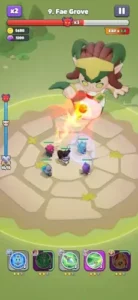- Strategy games on mobile have come a long way. What used to be a niche genre filled with timers and clunky UIs has evolved into something far more refined, hybrids that mix strategy, roguelike randomness, and streamlined gameplay into one addictive package. That’s where Wittle Defender comes in.
- Conclusion :
Strategy games on mobile have come a long way. What used to be a niche genre filled with timers and clunky UIs has evolved into something far more refined, hybrids that mix strategy, roguelike randomness, and streamlined gameplay into one addictive package. That’s where Wittle Defender comes in.

Developed by Habby, the studio behind Archero and Survivor.io, Wittle Defender blends tower defense, card-based decision-making, and roguelike unpredictability into a dungeon crawler that’s as accessible as it is layered. With over 500,000 downloads and a 4.6-star rating on Google Play, it’s clearly struck a chord with players.
What is Wittle Defender?
At its core, Wittle Defender is about building a squad of heroes and sending them into dark, moody dungeons to survive wave after wave of enemies. The catch? You’re not controlling every move. The game uses auto battle mechanics, which means once a run starts, your heroes fight on their own.
That might sound passive, but the real gameplay happens between the fights. You choose your heroes, upgrade their skills, select gear, and make strategic decisions mid-run through skill cards and unit summons. Think of it less like an idle game and more like a coach on the sidelines, you’re setting the strategy, not mashing buttons.
This setup removes the grind of moment to moment combat and lets players focus on planning, squad synergy, and long-term progression. It’s hands off where it should be, and involved where it matters.
Strategic Layers Behind the Simplicity
Despite the hands-free battles, Wittle Defender stacks several layers of strategy that make each decision meaningful.
Hero Squads
You start by assembling a squad of up to five heroes, each filling a unique role. There are nearly 100 characters to unlock, from heavy hitting tanks to glass cannon mages. Heroes like the Blazing Archer, Thunder Pharaoh, and Ice Witch don’t just look different, their skills change how you approach a run. Finding the right mix of damage dealers, support, and crowd control can make or break your chances, especially in later dungeon floors.
Card System
During runs, you’ll periodically choose between three random skill cards. These can add buffs, summon temporary allies, or give your heroes powerful new abilities. The timing and type of card you pick can completely change how a run plays out. Do you go for an immediate stat boost or invest in something riskier that could pay off later?
Runes and Gear
Outside of battle, you’ll collect runes and equipment that permanently upgrade your heroes. This progression system adds a longer term layer of planning, deciding which heroes to invest in, which gear to enhance, and how to combine runes for maximum effect.
Treasure and Skins
To keep things interesting, treasures grant new passives or combat effects, and hero skins can be unlocked for visual flair. None of it feels like filler. Treasures, in particular, have real gameplay value, encouraging you to experiment with different builds.
What Makes Each Run Feel New
Wittle Defender avoids repetition through clever use of randomization and variation.
Procedural Dungeons
Every dungeon run is procedurally generated. That means enemy waves, layout, and card offerings change each time, keeping players on their toes. You can’t brute force your way through with one strategy, adaptation is part of the experience.
Wave Variety
Enemy types and boss mechanics vary significantly. One floor might test your positioning with ranged enemies; the next might throw a damage immune mini boss at you. Even with the same squad, different runs feel distinct.
Xenoscape Summons
As you progress, you unlock Xenoscape heroes, powerful units that can dramatically alter the outcome of a run. Because they’re rare and often situational, using them well can be a game-changer, especially in the deeper, more punishing dungeons.
Is It Really Hands Off? The Role of Auto Battle
Yes, the combat is automatic. But that doesn’t mean it’s brainless.
Auto-battle handles the actual fighting, targeting, attacking, and movement, but you’re still making the high level decisions. Before a run, you choose your team and gear. During the run, you pick skill cards, manage energy, and decide when to use revival items or backup units. What looks passive on the surface is really about preparation and foresight.
Some players may miss having more direct control. It’s a valid gripe. But for those who enjoy strategy without needing to tap furiously every second, this format works. Wittle Defender rewards thoughtful planning, not reflexes.
And that’s the point: it doesn’t try to be a twitchy action game. It leans into what it does well, layered strategy delivered at a pace you can think through.
Strengths and Shortcomings (With Player Feedback)
Like most games in this space, Wittle Defender has its strengths, and a few sticking points that players regularly point out.
What’s Working
-
Hero Variety and Balance
With nearly 100 heroes available, the game does a solid job of making each feel distinct. Roles are clear, synergies are noticeable, and there’s no obvious “meta” dominating everything. That gives players room to experiment without feeling punished for not chasing the strongest picks. -
Visuals and Animations
The art direction leans dark and moody without being dull. Character designs are polished, and ability effects look great in motion. You can tell Habby’s been fine tuning this visual style over multiple games. -
Replayability
Thanks to procedural dungeons and random card draws, no two runs are quite the same. That unpredictability, paired with a growing roster and rune builds, keeps the gameplay from going stale.
Needs work
-
Energy System Limits
A recurring complaint is how slow energy regenerates. If you’re out, you’re stuck waiting or spending premium currency – not great when you’re mid-progress or in the mood for back to back runs. -
Revival Restrictions
Only one hero revival per run adds tension, but some players feel it leans too far into punishment, especially when runs are long and bosses hit hard. -
No Mid-Run Saving
Progress doesn’t save during a run. If the app closes or crashes, your run resets, frustrating when you’ve already cleared 10+ waves and made smart choices. -
Resource Grind
Hero upgrades, summons, and gear improvements all take time, and a lot of materials. While this encourages steady progression, it can feel slow or punishing if you’re not spending money.
Tips to Make the Most of It
If you want to progress efficiently, and avoid wasting resources, a few smart habits go a long way.
-
Think in Roles, Not Just Power
Don’t just stack your team with the highest-level or rarest heroes. Balance is key: pair a tank with a ranged DPS, add a support or crowd control unit, and make sure you’re not overlapping too many similar roles. -
Be Strategic with Card Choices
Early cards set the tone for a run. Look for effects that complement your squad, synergy beats randomness. If your team is fragile, prioritize survivability over raw damage. -
Use Energy Intentionally
Since energy is limited, avoid half baked teams or risky builds. Save your runs for when you’ve got a decent squad and plan, or you’ll burn energy without progress. -
Join a Guild ASAP
Active guilds offer rewards, boss fights, and a way to peek at other players’ setups. It’s a quick way to earn extra resources, and learn what works. -
Focus Your Upgrades
It’s tempting to spread resources across many heroes, but you’ll go further by focusing on 5 – 6 core units. Max their runes and gear first, breadth can come later.

Games You Might Like If You Enjoy This One
If Wittle Defender clicks for you, there are a few other titles that scratch similar itches, each with its own twist.
-
Archero (Habby)
Real time dodge and shoot roguelike with skill cards. More reflex based, but shares Wittle’s upgrade loop and random run structure. -
Survivor.io (Habby)
Also from Habby, this one’s a survival shooter with auto attacks and chaotic enemy waves. Fast-paced, but has similar hero upgrade mechanics. -
Dungeon Defense (GameCoaster)
More old school tower defense with deeper control. You’ll have to manage formations and positioning manually, more micro, less idle. -
Soul Knight (ChillyRoom)
A dungeon crawler with tighter action and co op play. Less strategy, more bullet-dodging, but great if you want direct control. -
AFK Arena (Lilith Games)
Idle RPG focused on hero collection and long term progression. The combat is slower, but the team building and resource grind are comparable.
What sets Wittle Defender apart is how it lands right in the middle, not as passive as a pure idle game, not as twitchy as an action roguelike. It’s strategy first without demanding constant input.
Conclusion :
Wittle Defender isn’t loud about what it does, but there’s a lot going on under the hood. It takes the hands off ease of an idle game, wraps it in roguelike progression, and adds real strategic depth through hero building, card selection, and resource management.
The visuals are polished, the progression feels satisfying (if a bit slow at times), and the replayability is genuinely strong. Yes, it has its tradeoffs, you’ll need to be okay with auto battle and some grind, but if you enjoy planning, experimenting, and gradually optimizing a squad over time, this one’s worth your attention.
FAQ
Is Wittle Defender free to play?
Yes, it’s free to download and play. There are in-app purchases, mostly for hero summons, cosmetics, and progression boosts.
Where can I download Wittle Defender?
You can find it on Google Play and most other Android app stores. iOS support may vary by region.
Can I play Wittle Defender offline?
No, it requires an internet connection to save progress and sync your game with servers. Closing the app during a run may cause data loss.
What’s the best way to get strong heroes?
Joining a guild early helps. You’ll also want to focus on events, resource farming, and smart rune upgrades rather than relying only on summons.
Where can I find more info or contact the devs?
The developers are active through their official support email: wittledefender[at]habby.com. Community discussion happens in various Reddit and Discord groups.
